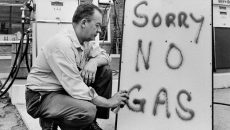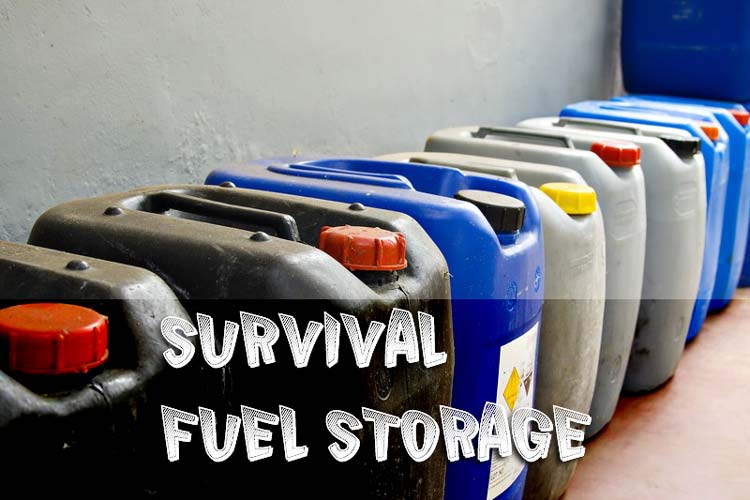Stockpiling gasoline beyond your vehicle's built-in tanks and maybe some spare cans is legally regulated in many places, so do your due diligence and find out what the law says for your particular situation. Such laws may be the result of legitimate safety worries, environmental concerns surrounding transportation and storage, or there may be other motives. Do a little research. Besides legal concerns over storing large amounts of gasoline or diesel there are some practical factors to address, as well. Diesel and gasoline don't age well, so unless you are able to cycle your large fuel store at your bug-out location, you'll need to treat your stored fuel with proper additives.
 If you're using large storage drums or a big tank, you also will need a way to pump the fuel properly. Remember: if you're serious about preparing for a disaster scenario you might also not have electricity readily available. Either get a hand-powered pump as a back-up or even as your main method of transferring the fuel so you don't have to burn some of the precious fluid running a generator just to pump! Don't forget safety supplies, either. Just because laws may be breaking down around you doesn't mean you shouldn't follow simple safety precautions. Be prepared for spills with some Floor-dri or similar product and be certain you can manage sparks or fires! No law, no infrastructure probably also means no fire department or haz-mat team to help out.
If you're using large storage drums or a big tank, you also will need a way to pump the fuel properly. Remember: if you're serious about preparing for a disaster scenario you might also not have electricity readily available. Either get a hand-powered pump as a back-up or even as your main method of transferring the fuel so you don't have to burn some of the precious fluid running a generator just to pump! Don't forget safety supplies, either. Just because laws may be breaking down around you doesn't mean you shouldn't follow simple safety precautions. Be prepared for spills with some Floor-dri or similar product and be certain you can manage sparks or fires! No law, no infrastructure probably also means no fire department or haz-mat team to help out.
As mentioned, powering vehicles is only one reason you may need to store fuel. Skilled Survival listed some great pointers about fuel storage besides gasoline and diesel:
Firewood
Firewood is probably the most common form of fuel to store for long term survival. Why?
Firewood is often abundant (location dependent), it’s relatively inexpensive, it’s not complicated to store, and there are no laws on how much you can store. Firewood is also great for creating heat and cooking foods without electricity or chemicals.
You also need to plan to allow firewood to be seasoned to get the most benefit from it.
Seasoning firewood consists of chopping it, splitting it to useable sizes and then storing it in a dry location for at least six months (a year is better) before use.
Long Term Gasoline Storage: The Most Popular Bug Out Fuel
While there are quite a few diesel vehicles on the road, gasoline powered engines still dominate. Only about 3% of all US vehicles are diesel powered.
So 97% of US road vehicles are gas based…
What happens when SHTF and gas stations have no electricity to pump?
Or what if the gas stations are overrun with extremely long lines due to panic and go empty within hours?
You better hope you have enough long term gasoline storage to get to your bug out location.
Gasoline left alone, won’t keep…it has a very short shelf life. As it ages, it will quickly deteriorate over time. If you store this fuel long enough, it will eventually become useless. Essentially it’s one of the most difficult fuel to store long term.
So you have two options…you can either learn how to store gasoline long term (keep it from deteriorating) or come up with a regular fuel rotation system.
How To Store Gasoline Long Term
Gasoline stabilizer additives are designed to be periodically added to your stored fuel to prevent natural deterioration of its ignition properties.
Just add the stabilizer to your gasoline within a year, mix well and you’re ready for another year. It generally needs to be done every year…not just once.
How Much Gasoline Should You Store?
This depends on a variety of personal factors, but in general, I suggest storing 25% more than it takes to get to your bug out location.
Diesel Fuel
You’ll want to store diesel fuel instead of gasoline if your bug out vehicle of choice is diesel powered.
The Diesel Fuel that is typically seen today is actually Ultra Low Sulfur Diesel Fuel or also referred to as ULSD. The Diesel fuel that was stored “back in the day”, lasted for numerous years without any deterioration effects.
However, with the new formulation, ULSD will typically won’t last much more than about 6 months. You can extend the life of USLD by adding additives to the diesel fuel storage tanks (similar to gasoline).
Another way to extend the life of the USLD would be the process of nitrogen blanking the fuel, which will increase the life of the fuel indefinitely.
Nitrogen Blanking involves injecting external nitrogen into the diesel fuel storage tanks.
You inject the nitrogen as the fuel increases and decreases from the use and any temperature change basically by removing the empty space in the tanks and replacing it with nitrogen.
This removes the atmospheric air in the diesel fuel storage tanks that can cause fungus to grow since it is made up of both oxygen and water.
KeroseneKerosene is an ideal fuel to store because of its versatility. It can be used for lighting, heating, and cooking.
Kerosene is considered a non-volatile fuel, meaning won’t explode (unlike gasoline), which is always a plus.
It can also be stored for many years without significant degradation. Kerosene is very dense in energy and holds almost 50% more energy than propane.
Propane
Propane is relatively straightforward to store. It can be stored in propane storage tanks in both large or small quantities.
There are different sizes of propane storage tanks available so you would need to check with the supplier to see what sizes are available, as well as what sizes are permitted to be stored in your state.
Unless the crisis you're preparing for will definitely be over quickly, you'll want to store as much fuel as you're comfortable maintaining, and in some cases, defending. The more different types you must store, the more complex the task becomes, so keep that in mind as you develop your long-term strategy. In the end, having enough fuel also comes down to how effectively you find alternatives to hard-to-acquire sources like gasoline. If you expect to be in it for the long haul, wood for heating and cooking and animals for cartage may be necessities.
Alternative power sources – and storage – such as wind, solar, and water are each huge topics on their own, but a plan for safe long-term fuel storage will get you through the tough parts when those alternatives are not viable.
Have any other fuel storage recommendations we missed? Let us know in the comments.

The problem is that gas doesn’t last ling
Richard Thomas Middaugh
How can you store gasoline long term if it goes bad?
Treat with StaBil and stores for a couple yrs.
Use double the recommended amount – alcohol (Ethanol) absorbs water (moisture in the air) so make sure that the containers are airtight.
Good luck, it works but not as long as you think
That’s my question. If it goes bad anyways, you can’t store it very long.
StaBil works for over a year. When we deploy and store our personal vehicles at off base lots thry put it In the tank. Then every month they run the engine. So it worked in my vehicle.
With stabil, 5 years max, without ethanol.
Use stabil, seal, no ethanol. Gas 5 years,
diesel up to 10 years
Andy O Brien all gas has ethanol now
Diesel last forever though
Bob Peisley, Nick Greer, Alex Greer, Tyler Seawright
Diesel is no problem, however quality can decrease. That won’t be a problem for old diesel-engines. Modern common-rail diesesl however – I wouldn’t bet on them with older oils.
Gasoline – just don’t. Shelf life isn’t that thrilling.
John M. Stryker I store gas for my hurricane generator in 5 gal cans with StaBil. At the end of the hurricane season, I use it in my car. I purposely kept one jug for over a year and it still ran my engine fine. It’s an annual thing for me in Fl.
I’ve used stabil in my boat in the diesel tanks and the fuel was in there for 4 years and still ran fine. With diesel or gas the thing is use a fuel stabilizer and keep,it in a controlled environment, i.e. In an area that doesn’t have a high fluctuation of temp. Like in the lower area of a storage building that does not get a lot of sunshine. Like the north well. That helps to keep the temp from fluctuations from bring too extreme. In a root cell ER or in a small metal storage bin under ground.
Good ideas
Rotate often is the key .
PRI-G
Kolks, safe storage of fuel is vital. You can put Stabil in the gas and it will keep it from deteriorating over time. However, with fluctuation in temperature, you’re sure, through expansion and contraction, to have vapor produced. This vapor is an explosion risk. Gas or diesel, should be stored away from your house, and away from your neighbors’ homes. The shed, or whatever you use, should be well vented. A spinning top vent should be on the top of the shed and there should be at least four screened intake vents at the bottom of each wall. This reduces the risks of an accidental ignition and explosion. My advice for electricity is to build a stand alone solar powered generator. You can size it as big, or as small as you need to. It’s silent and takes no gas. The only pain is battery maintenance and keeping the solar panels clean (dirty panels don’t work as well). Then, you can keep the fuel in reserve for emergencies, like getting the hell out of Dodge.